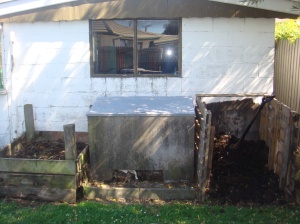I was given a book about composting for Christmas by my brother. After reading all of about two pages I was hooked, and this is the first time I’ve been hooked on something that is telling me how wrong I have been my whole life!
Here is a quick list of things to do to make great compost:
- Add lots of leaves to your compost pile – more leaves than anything else
- Don’t add any large branches or sticks to your compost pile
- Turn your compost pile over with a fork once a fortnight or month
If you just want to make great compost for your garden, follow these three tips. If you want to know more then read on.
Benefits of Composting
According to my book, composting well helps to control weeds, prevent plant disease, improve soil structure and improve crops. Three of those I can believe, but how does composting help to control weeds? Well I tried a load of compost from a local outlet here in Christchurch, and I’ve got to say it works. Plus I found the experience of buying dirt quite satisfying considering!
My garden has less weeds with it’s layer of compost for a few reasons.
- The compost has fewer weed seeds than the soil I put it on.
- The compost covers the weed seeds below preventing them from ever surfacing.
- Those that do surface are easier to pull out because of the improved soil structure. Even the longer rooted weeds come loose easily.
So that proves it for me – compost helps prevent weeds and decreases my weeding time.
NOTE: Probably the most instinctive way to deal with weeds is to turn the whole bed over with a tiller, rotary hoe, or fork. This is a bad idea. Try applying your compost to the top and when weeds appear pull them out without disturbing the soil too much. This way eventually all the seeds capable of germinating will be removed and you won’t be constantly turning up more seeds to the top. This is a tip from permaculture and the no-dig gardening method.
Why Leaves make good Compost
Leaves are the missing ingredient in most of the compost bins I know about. Basically everyone throws their grass clippings in the compost, and everyone throws their household rubbish in there. But composting requires a ratio of Carbon to Nitrogen, and these ingredients are all Nitrogen rich. This results in a rotting pile of rubbish rather than the good compost you buy from the shops. Leaves and other brown material provide the best source of Carbon and should be added in at least as great a quantity as the other stuff. If you mix them together real well your compost will be, as they say, black gold.
Methods of Composting
My favourite method of composting mentioned in my book, and tested in my back yard is to have two alternating compost heaps. Over the course of my compost’s life it will have been turned a couple of times, and shifted into a completely separate bin once. This ensures good airing of the decomposing matter and will speed up the process and prevent rotting. The stuff at the bottom will decompose the fastest and airing will help the pile get hotter, so moving from one bin to another really helps the process along.

My compost bins on the left and right for oxygenating the compost. In the center is my larger worm farm.
Another method of composting is worm farms. I have two worm farms, one for our household which is right by the back door, and another much larger one for my work’s food scraps which I collect weekly. Worms take care of scraps faster than my compost heap and produce some very good by-products along the way. You can read my post on Worm Farming for more info on this approach.
One other method I use for composting is what I like to call “Chicken Rotation”. Simply by moving my chickens around the garden and throwing them food scraps I help to condition the soil for future planting. The soil is turned from dried out waste soil into nitrogen-rich soil with good structure where my vegetables will flourish next season. The chickens reinvest the goodness in their feed into the soil.
With Autumn on the way it’s a good time to start preparing for some leaf collection! I have three woolsacks ready for filling with some mulched leaves which I will add to my compost heap every time I add nitrogen rich matter over the winter through to summer months.
Good luck with your compost!

No comments:
Post a Comment